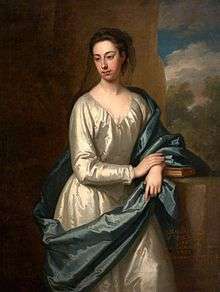Joseph Yorke, 1st Baron Dover
General Joseph Yorke, 1st Baron Dover KB, PC (24 June 1724 – 2 December 1792), styled The Honourable Joseph Yorke until 1761 and The Honourable Sir Joseph Yorke between 1761 and 1788, was a British soldier, diplomat and Whig politician.
Background

Yorke was the third son of Philip Yorke, 1st Earl of Hardwicke, by Margaret, daughter of Charles Cocks. Philip Yorke, 2nd Earl of Hardwicke, Charles Yorke and James Yorke were his brothers.[1]
Career
Yorke served in the War of the Austrian Succession as an aide-de-camp to the Duke of Cumberland, and fought in the Battle of Fontenoy in 1745. He became a Major-General in 1758, a Lieutenant-General in 1760 and a full General in 1777.
In 1749 he was appointed Secretary to the British Embassay in Paris. Two years later he became Minister Plenipotentiary to the United Provinces, a post he held for the next thirty years. He was involved in the Anglo-Prussian Convention in 1758.[2] His post was upgraded to that of ambassador in 1761.[1] During this period he also sat in the House of Commons for East Grinstead between 1751 and 1761,[1][3] for Dover between 1761 and 1774[1][4] and for Grampound between 1774 and 1780.[1][5] He was appointed a Knight Companion of the Order of the Bath (KB) in 1761 and sworn of the Privy Council in 1768.[1] In 1788 he was raised to the peerage as Lord Dover, Baron of the Town and Port of Dover, in the County of Kent.[6]
Family
_memorial.jpg)
Lord Dover married Christiana Charlotte Margaret, daughter of Johan Henrik, Baron de Stöcken, a Danish nobleman, in 1783. They had no children. He died in December 1792, aged 68, when the barony became extinct. Lady Dover only survived her husband by three months and died in March 1793.[1]
References
- thepeerage.com General Joseph Yorke, 1st and last Lord Dover, Baron of the Town and Port of Dover
- [https://www.cambridge.org/core/journals/albion/article/lord-bute-newcastle-prussia-and-the-hague-overtures-a-re-examination/7AE4AF099326DEEC194BDC0E00E005B4 Lord Bute, Newcastle, Prussia, and the Hague Overtures: A Re-Examination by Karl W. Schweizer]
- "leighrayment.com House of Commons: Ealing to Elgin". Archived from the original on 29 October 2013. Retrieved 23 October 2010.
- "leighrayment.com House of Commons: Dover to Dulwich and West Norwood". Archived from the original on 30 September 2018. Retrieved 23 October 2010.
- "leighrayment.com House of Commons: Gorbals to Guildford". Archived from the original on 5 November 2018. Retrieved 23 October 2010.
- "No. 13024". The London Gazette. 9 September 1788. p. 437.
External links
- . Dictionary of National Biography. London: Smith, Elder & Co. 1885–1900.
| Parliament of Great Britain | ||
|---|---|---|
| Preceded by Sir Whistler Webster Sydney Smythe |
Member of Parliament for East Grinstead 1751–1761 With: Sir Whistler Webster |
Succeeded by Earl of Middlesex Lord George Sackville |
| Preceded by Lord George Sackville Sir Edward Simpson |
Member of Parliament for Dover 1761–1774 With: Sir Edward Simpson 1761–1765 Marquess of Lorne 1765–1766 John Bindley 1766–1768 Viscount Villiers 1768–1770 Sir Thomas Hales, Bt 1770–1773 Thomas Barret 1773–1774 |
Succeeded by John Henniker John Trevanion |
| Preceded by Grey Cooper Charles Wolfran Cornwall |
Member of Parliament for Grampound 1774–1780 With: Richard Neville |
Succeeded by Sir John Ramsden, Bt Thomas Lucas |
| Military offices | ||
| Preceded by Hon. John Waldegrave |
Colonel of the 9th Regiment of Foot 1755–1758 |
Succeeded by William Whitmore |
| Colonel of the 8th Regiment of Dragoons 1758–1760 |
Succeeded by John Severne | |
| Preceded by John Mostyn |
Colonel of the 5th Regiment of Dragoons 1760–1787 |
Succeeded by Robert Cuninghame |
| Preceded by Hon. Thomas Gage |
Colonel of the 11th Regiment of (Light) Dragoons 1787–1789 |
Succeeded by Studholme Hodgson |
| Preceded by The Marquess of Lothian |
Colonel of the 1st Regiment of Life Guards 1789–1792 |
Succeeded by The Earl of Harrington |
| Diplomatic posts | ||
| Preceded by The Earl of Holderness |
Minister Plenipotentiary to the United Provinces 1751–1761 |
Office upgraded to Ambassador to the United Provinces |
| Preceded by Minister Plenipotentiary to the United Provinces |
Ambassador to the United Provinces 1761–1781 |
No representation due to Fourth Anglo-Dutch War |
| Peerage of Great Britain | ||
| New creation | Baron Dover 1788–1892 |
Extinct |